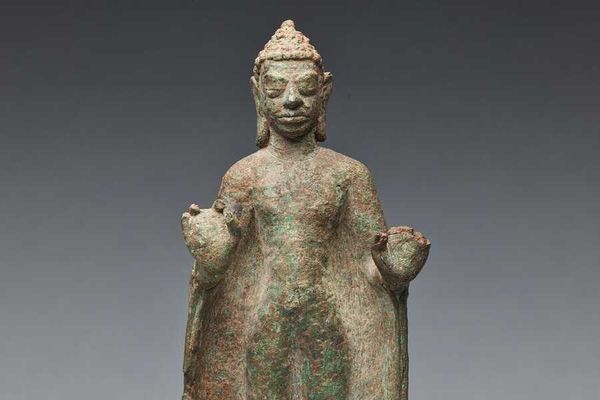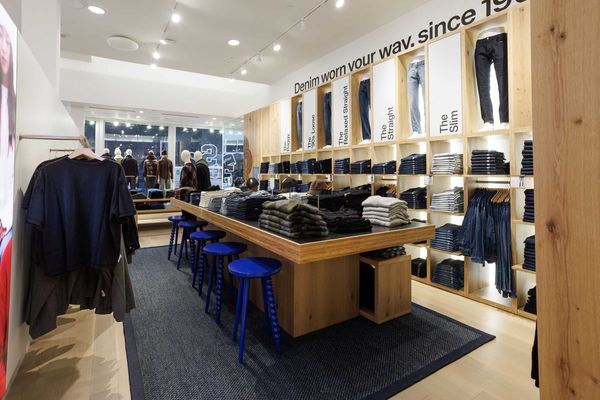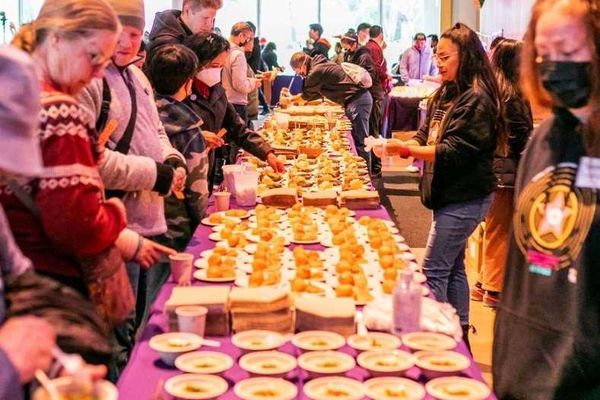In our book, it doesn't get much better than Liars. From their dance-punk leaning debut They Threw Us All in a Trench and Stuck a Monument on Top to their most recent oh-so-unclassifiable effort Sisterworld, the perennial critic favorite has consistently proven themselves to be one of the most unique, unpredictable and all around exciting acts in indie rock today. We had the great pleasure of catching up with frontman Angus Andrew before their near-capacity show at Slim's this week, where we discussed the group's unique take on Los Angeles, forgotten b-sides, musical fundamentals and much more.
After stints in New York, New Jersey and Berlin, you have finally returned to Los Angeles, the birthplace of Liars. What prompted the move back?
Like you said -- returned to Los Angeles. We met there, and Aaron and Julian are from there. Actually it was some sort of tacit agreement I made with them after we made the last record. You know we made two records in Berlin -- the first one they were there more for, and the second one they were kind of flying in for. So I brought up the prospect that I would move back to L.A. with them and record there, which would sort of be more like them being at home, and certainly more comfortable.
A lot of the reviews of Sisterworld have focused on the profound impact Los Angeles had on the song writing process, invoking those notions of alienation, violence and dislocation that loom so large over the record. Did the bands return to L.A. planning to explore and in a sense draw inspiration from these oft ignored realities of the city, or were these themes that came to you more organically?
It was really more organic -- when we came here I didn’t know what we were going to make the record about. But you know, as soon as I got to L.A. and started to fall into a routine, I immediately became aware that the city was going to be a big influence on what I was writing. A lot of our records have dealt with ideas of alienation or dislocation, but L.A. was the first city that really made those ideas pop for me. So I took these ideas I had been dealing with before, threw them out over the landscape of L.A., and found that everything just seemed to have so much more meaning and character.
But I have been interested in L.A. for a long time. It is is in a sense the exemplary of the post modern city, and has always had this very resounding image and profile around the world -- Hollywood-based celebrity, beauty, wealth and whatnot. But the reality of Los Angeles is so dramatically different. I guess in general I am intrigued by the idea of California historically being this place where you migrate to in order to sort of fulfill your hopes and dreams, really from back in the gold rush days to the present. Coming out of San Francisco, the whole dot-com boom was another example of this – it's an idea of what is happening, rather than the reality of things.
And how about with the music -- were there any specific records or artists that helped to shape the sound or overall vibe of Sisterworld?
It’s always hard for me to pin down any kind of musical influence, especially when making a record. When coming back to America and L.A., things were coming to me much more poignantly from stuff like Judge Judy and the LA Times. I felt like I was mainlining culture, listening to KROQ and things like that. Just all these things I didn’t have when I was in Berlin -- there was just a real influx of that kind of inspiration.
But in terms of music, just generally it’s interesting for me that we are somewhat on this reverse learning curve for musicians. I feel like I really started with sound, and using that to express ideas. But as time has gone on and I’ve had more chance to learn and work, I have become more interested in notes, chords, and what I would call the more traditional aspects of songwriting. I think for this record, it has come to the point where I am really learning about those things -- those sort of very fundamental elements of music making that were never very important to me before.
Would it be safe to say that this exploration of musical fundamentals began with 2007's Liars?
Yea absolutely -- the last record definitely informed that, and I feel like this record was the chance to take some of those more formal ideas to their final outcomes, with strings and horns and things like that. Just to be able to allow for that and work with melody in that way is something that is kind of new to me. It feels more experimental than if I was to sort of plug in a Juno or something.
I don’t know if it will continue that way, but it certainly [was a focus] with last two records -- trying in a way to figure out how to be involved in the musical language. I always felt like we were trying to be apart from it, exploring approaches to music that were not part of these regular forms. But at some point I felt this desire to engage in these things that are more common in music, like you know a C or something like that [laughs]. And when you work with those things it is kind of an amazing rush -- it’s like wow, I’m actually using the language that some of these other great bands I love have used in the past.
Despite these similar musical ideas, I understand that Liars was conceptually a unique record for the band, as you focused more on emphasizing specific tracks and less on creating an overall narrative or theme for the record. Looking back, do you have any strong opinions or feelings regarding the somewhat more traditional approach to song writing you explored on that release?
Well it is certainly something I am glad we did. I think when we made that self-titled record we were trying to see what it was like to work without that [complete album mentality]. And you know at the time it felt necessary, and it’s something that really informed the way we are approaching music now. It basically made me realize what I enjoy about making albums – it’s not just making ten or eleven songs and putting it together. It’s more about creating a life or a story for the record, something that is bigger than just a song.
I have actually always been struck by something similar with your live shows. So much has been written about how varied each album is musically. Yet in the live setting, you manage to gracefully work in tracks and elements from each era of Liars -- rather than feeling like a collection of greatest hits, each set-list almost feels like a complete album in its own right.
It’s definitely an important thing for me to think about what songs we put together on stage. And it’s a tricky time for us right now, because we are still trying to figure out what we are capable of doing. We are not really a band that sits around in a room with a six-pack and jams out the songs, so when it comes to playing them live we sort of have to learn how to play them again. But I think part of the thing now is -- it’s really exciting to go back to some of the old songs with a five-piece lineup and sort of give it another going over. That’s what’s so attractive about going back to some of the older songs. And I think that it sort of serves to show that even though it seems like we have been painted as this band that changes style with each record and such, the essence of the music is the same – it’s just us using different tools. So when you hear some of those songs back-to-back you sort of realize that some of the stuff that we have been making is really not that different than what we were doing many years ago.
And you know, the narrative is definitely incomplete when you take out any one of the albums. Whatever they are worth individually, I think as a whole it is just as important that they are all there. For me, it’s really a way of watching us learn and sort of see the process of how we have gone through the different ways of making songs.
You mention a five-piece band. Can you elaborate on these touring additions to the core trio?
Members of Fol Chen will actually be joining us on stage throughout the tour. The idea is how many more of them will we incorporate [laughs]. Like I said, at the moment it is still the early days for us in terms of doing these live shows. And I am hoping that after some time on the road with both bands we can do some sort of new amalgamations.
Changing directions a bit, but I really like the concept behind Sisterworld Reinterpretations -- rather than handing the stems over to the usual lot of producers, you asked bands like The Melvins, Throbbing Gristle and Atlas Sound to remix your tracks. How did this all come about?
It sort of started with that idea you said right there -- I was just so sick of hearing one song remixed six times by the same DJs and producers. And you know, generally I couldn’t even tell the difference between "mix A" and "mix 7" or whatever. So we wanted to find some people that were more exciting, and who would maybe have more to offer in that department. We didn’t have any money, so I sort of called and emailed some people and said we have a song for you that we basically just want you to do anything to. I don’t know if we ever said “remix” -- it was just you know, have a go at doing something to this.
And are you fairly happy with the results?
I am man! You know, some of the artist felt like they needed our approval before they turned it in, but I really did not want to hear any of them until they were fully done and sent in. Really the most interesting part about it was not having any influence on it. And it is just so interesting to me -- both the idea of something that you write and the way you actually write it are always so specific. And to hear that exact same thing come back to you but in a completely different body -- it was amazing. Some of them were just so interesting that they replaced the original for me in terms of the way I hear the song now.
Your band has been known to reinterpret Liars' originals in a somewhat similar manner, both in the live and recorded setting. I understand that you even recorded a full album before Drum's Not Dead, which was ultimately scrapped and used as a sort of blueprint for the final release. I think it would be fascinating to hear the first attempt at the record -- have you ever considered releasing these b-sides and alternate versions?
It is really difficult because it just always seems so dated when you look back on it. We realistically have several records that have never come out. It’s just a question of the timing or placement, and it doesn’t seem to make sense to me right now. But we keep them, and they are in the bank somewhere [laughs]. It’s just a question of whether at some point it’s worth them coming out. The one you are talking about, the Drum's Not Dead one -- it certainly was different. I mean there are some of the same songs there. It just wasn’t recorded well, and basically we gave ourselves another chance to do it, and in the process sort of wrote a whole new record. So I always keep it in the back of my mind, but [releasing these] is certainly not something that is on my plate right now.
So what is next for Liars?
[Besides the tour], we have a video for "The Overachievers" in pipeline that Aaron is making. It's not his debut – he has done some videos in the past. But this is a big video for him, and I think it will be out soon.
Hopefully this one is a little easier on you than the video for "Scissor" -- it is an outstanding video, but I imagine filming in the water like like that was quite the experience.
The only word for it is “grueling!" I don’t know -- it was hard, and it was a long full day, and it was freezing, and I was wet the whole time. It is something I look forward to never doing again. But it was certainly worthwhile -- I always felt like it would be, even just the notion of being in the ocean. The sea is just such a great backdrop for what we are talking about -- it is just so beautiful and mysterious, but at the same time deadly.


















